March 25, 1991: Visit to Iraq
Steven Dutch, Professor Emeritus, Natural and Applied Sciences, University of Wisconsin - Green Bay
Mon 25 Mar
We went to Iraq today. We left about 0930 on a nice sunny day. The road leads through the choke point, then turns north. Along the way we passed more burning oil wells in the Rawdatain Field. At least 50 fires were visible, with another 20 or so in the distance to the east. The bus took us to Safwan, the first town in Iraq. Safwan is very poor and run-down, and not from the war. Many of the buildings are mud-brick, with wooden roof poles sticking out. It looks like an Indian pueblo or a town in Latin America. The contrast between what Kuwait did with its oil wealth, and what Iraq did with its is starkly evident here.
Relations between the locals and the occupying troops seem remarkably amiable. The kids mobbed the bus for candy. Male dominance starts early here; even small boys push the girls aside. There's lots of unexploded ordnance around. EOD blew ammo about 15 times in the two hours we were there, and cleared our street three times to blow ordnance in a building across the street.
We got back about 1530. I got a beautiful letter and picture from Shawn in the evening mail.
The Road North
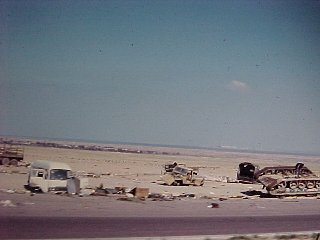 |
Just north of the choke point. |
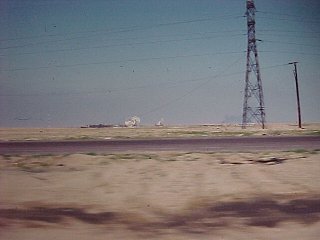 |
Wrecked communications dishes and downed power lines. |
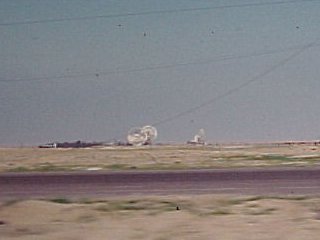 |
The Rawdatain Oil Field
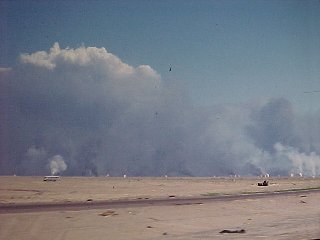 |
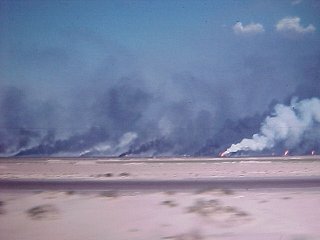 |
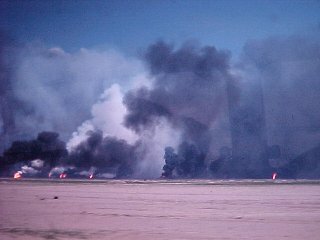 |
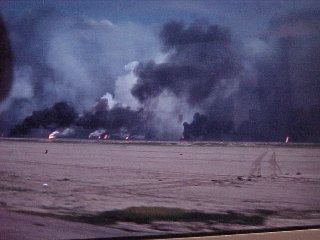 |
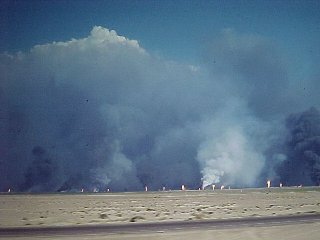 |
The jet black and snow white smoke plumes side by side indicate that it's not just burning oil. Gas proportions and completeness of combustion also played a role. The snow white, I later learned, was saly dust from salt water in the wells. |
In Iraq
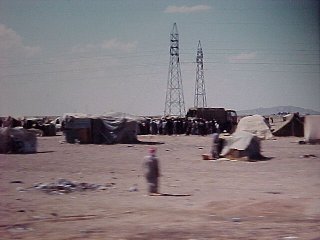 |
Camps at the border for Shiite refugees. |
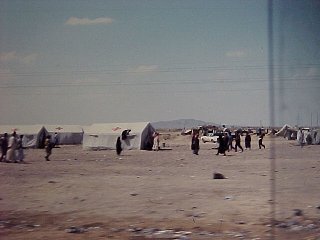 |
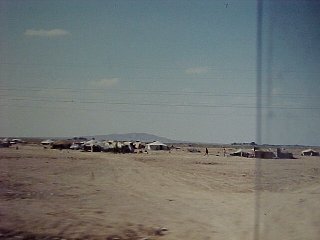 |
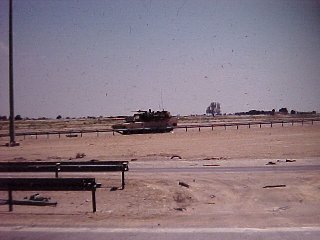 |
Now here's something you don't often see coming off a freeway. |
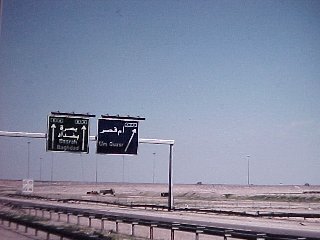 |
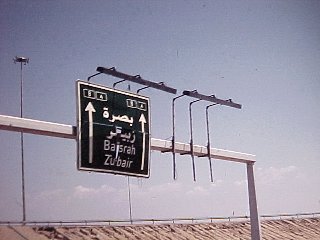 |
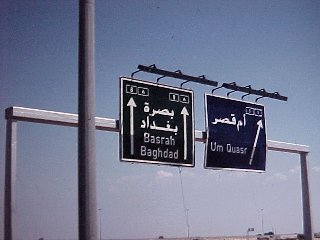 |
Safwan
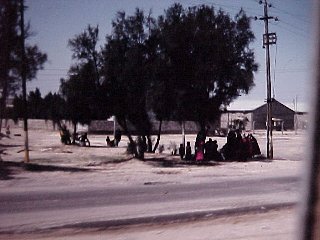 |
Okay, Kuwait isn't a democracy. Compare the oil reserves or Iraq with those of Kuwait. Then compare these pictures with the pictures of Kuwait city. That's what Kuwait did with its oil money. This is what Iraq has done with its. |
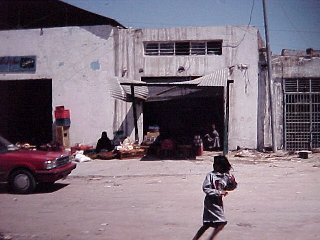 |
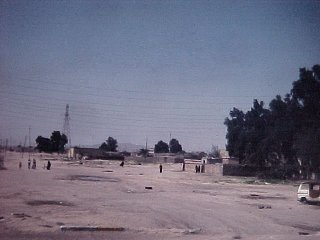 |
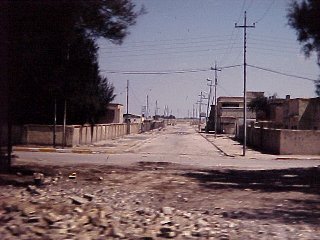 |
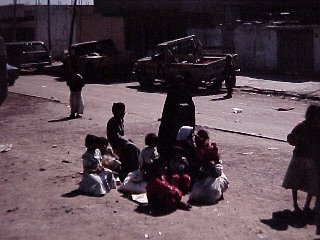 |
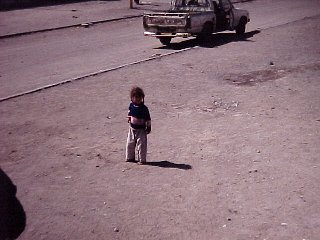 |
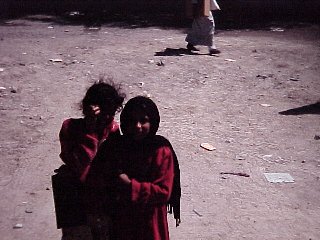 |
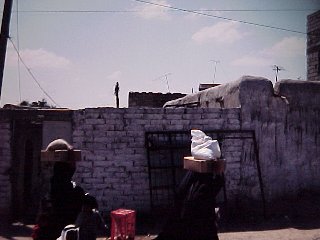 |
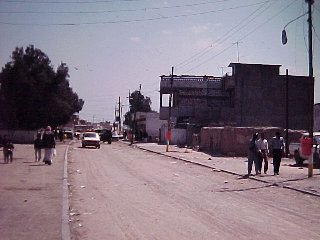 |
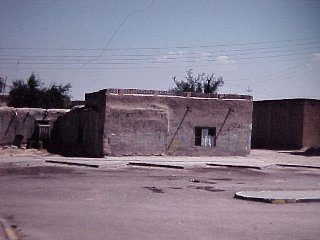 |
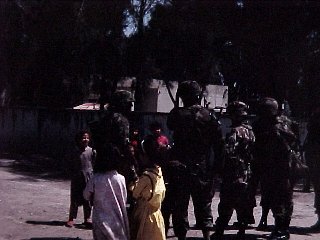 |
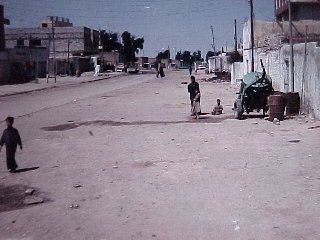 |
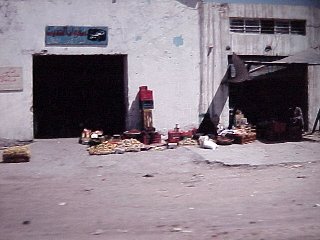 |
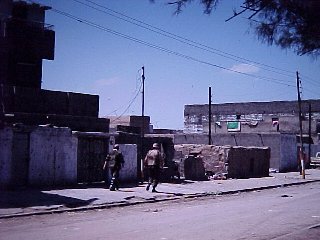 |
A Foretaste of Kurdistan
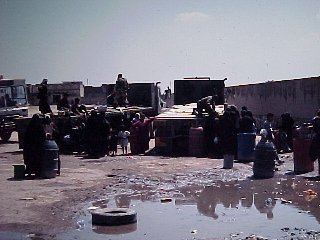 |
The 431st CA Company had people here assisting with Shiite refugees. These soldiers are distributing water. Water is the big life-support problem in refugee operations. If people have to go more than 24 hours without it, they resort to stuff like what's on the ground. |
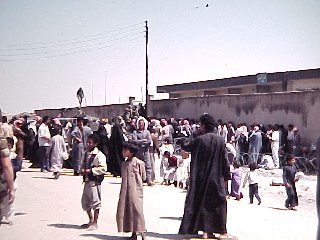 |
- August 2, 1990 - January 5, 1991: From the invasion of Kuwait to mobilization.
- January 6, 1991: Departure
- January 7-14, 1991: Settling in at Fort Bragg
- January 15-23, 1991: Fort Bragg Drags On
- January 24 - February 3, 1991: Preparing to Deploy to the Gulf
- February 4 - 5, 1991: Arrival in Country
- February 6-12, 1991: Khobar and Recon to Jubail
- February 13-20, 1991: Al-Jubail
- February 21-25, 1991: Al Jubail
- February 26, 1991: Tapline Road
- February 27, 1991: Return From KKMC
- February 28 - March 3, 1991: We Move Into Kuwait
- March 4 - 8, 1991: On Patrol in Kuwait
- March 9, 1991: The Choke Point
- March 10 - 11, 1991: A Chopper Ride
- March 11, 1991: Chopper Flight - The Oil Fires
- March 12-14, 1991: Oil Fires and Weapons
- March 15-16, 1991: A Congressman and a Private Museum
- March 17-21, 1991: Oil Fires and Routine Patrols
- March 22-24, 1991:Weapons Fire and Day Turns Into Night
- March 25, 1991: Visit to Iraq
- March 27-28, 1991: On the Coast and More Weapons
- March 31, 1991: Easter and Gergian
- April 1-5, 1991: Farewell Dinner and the Sand-Table House
- April 6-7, 1991: Farewell to Kuwait
- April 10-14, 1991: Khobar and Dhahran:
- April 15-16, 1991: Khobar and Bahrain
- April 17 - 23, 1991: Waiting for Kurdistan
- April 24-25, 1991: From Khobar to Incirlik
- April 26, 1991: From Incirlik to Zakho
- April 27-30, 1991: First Days in Kurdistan
- May 1-2, 1991: Camp I Rises
- May 1-2, 1991: Camp I Rises
- May 3-9, 1991: Camp I in Operation
- May 10-13, 1991: The Eventful Birth of Camp II
- May 14-17, 1991: Camp II in Operation
- May 18-19, 1991: Into the Mountains
- May 20, 1991: Kani Masi and Begova
- May 21, 1991: Nazdour and Begova
- May 22, 1991: Uzumlu
- May 23, 1991: Visit to Camp 1 and Nazdour
- May 24-25, 1991: Sirsenk and Silopi
- May 26, 1991: I'll Teach them to Nickname Me "Indy"
- May 27, 1991: Dohuk (Almost) and Kani Masi
- May 28-29, 1991: Return From the Mountains
- May 30, 1991: A Visit From Colin Powell
- May 31 - June 2, 1991: Chopper Flight over Dohuk; Zakho and Silopi
- June 3-7, 1991: Last Days in Kurdistan
- June 6-8, 1991: Incirlik and an Outing Down the Coast
- June 8 - 18, 1991: Out of Turkey and Back to Fort Bragg
- June 19 - October 11, 1991: Picking Up Where We Left Off
Go to Gulf War photo Pages
Go to Gulf War Text Diary
Go to Gulf War Combined photo-Text Pages
Go to 432d Civil Affairs Battalion Page
Return to Professor Dutch's home page
Created January 10, 2000; Last Update 11 June 2020
Not an Official U.S. Army page